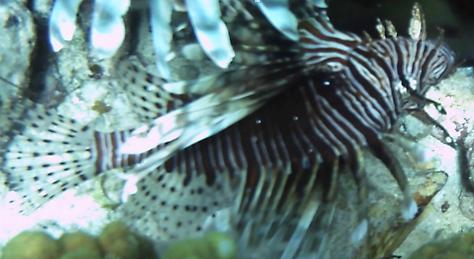|
|
Lionfish, or Pterois are majestic fish that have red, black, and white bands and hazardous spiky spines. They are one of the most beautiful fish in the planet. They have an average lifespan of fifteen years and a full grown adult ranges from thirty to forty centimeters in length.

While not native to the Caribbean Sea, the lionfish has nonetheless had an impact on reef life there. It is assumed that a few specimens of Pterois miles and Pterois volitans were released by aquarium owners and ended up breeding and spreading like wildfire. Now, twenty years later, it is the second most common fish in the Caribbean, next to grouper, because it can breed fast and efficiently. One male can mate with several females, and they can do this monthly, regardless of the time of year. The eggs are laid in two groups and float up to the surface in a mucus-like substance, which dissolves in a few days, and the eggs hatch into larvae.
Pterois are extremely aggressive with their territory and have driven many fish out of reefs and depleted fish populations. Since their spikes are so venomous, they can easily hunt for food. Lionfish have no natural predators in the Caribbean, but sharks are being trained to prey upon them, because the poisonous spines have little to no effect on most sharks. Another way people are combating the ever-growing population of lionfish in the Caribbean is by promoting a fishing industry for them. They are edible and would be easy to catch because there's so many of them.
In March, a group I was involved in traveled to the island of Eleuthera in the Bahamas to help survey patch reefs for scientists. During my time there, I encountered more than fifty lionfish. They were one of the fish I was assigned to survey, so I had to count them all, and the amount of them was just astonishing. Experimental reefs that did not have lionfish (they were removed physically) looked to be in much better condition than ones that did have them.
In the Bahamas, lionfish are looked upon as pests because they make their top industry, fishing, much harder. Their abundance brings down other fish populations. Some species of grouper like the Nassau grouper are already threatened or endangered, so many species at risk groups are concerned.
Although lionfish are poisonous, the venom does not normally kill humans. The sting causes a lot of pain, headaches, nausea, vomiting, etc. These spines are usually only used for self-defense or to feed on their prey, such as grouper. Therefore, most stings to humans are accidental circumstances, like stepping/sitting on ledges of coral that lionfish lurking beneath. In the Indian Ocean, researchers have noticed that their aggression had transferred from reef fish to divers, but in normal circumstances, they do not attack people.
All in all, lionfish are having a seriously negative effect on the Bahamas and the rest of the Caribbean. While it is great to see a fish thriving, it is doing so at the expense of almost every other reef fish in the whole sea. As such, they must be stopped immediately, and the best option might be just to start hunting and creating an industry for them. They are way too efficient for their own good, and if they are already so abundant after just twenty years how many of these dangerous fish will there be in another twenty years?
Author's Note: If you want to learn more about reef systems, you can visit Whyville's own coral reef, the Whyreef! For further reading, visit article IDs: 5635, 10516, and 12001.
|